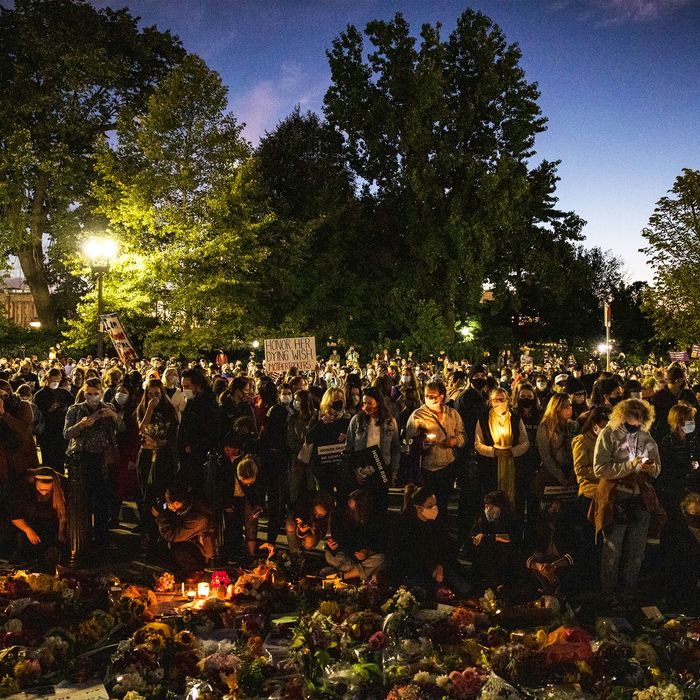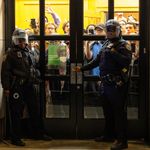
Grief holds a lot of data, and I was curious if something raw was being revealed by RBG’s death. So on Saturday morning I went to the steps of the Supreme Court where a vigil had been going since late Friday night, the eve of Rosh Hashanah. The crowd of a few hundred was quiet, somber, and much whiter than the crowds that have lately gathered in downtown D.C.
“Civility,” Carol Vernon said when I asked her what she admired most about Ginsburg. “She was an advocate but she could still talk to anyone.” For example: Ginsburg’s famous friendship with the conservative Justice Antonin Scalia. “Would you be friends with Scalia, if he were alive?” I asked Vernon. “Absolutely not,” she said. “I might even poison his drink.”
Nearby, a mother theatrically lectured her two daughters, neither older than 10. “Just because Mommy’s a lawyer doesn’t mean I’ve been treated fairly. I’ve had to work twice as hard …” She trailed off, distracted by a young woman in front of them who was on her knees writing in chalk on the ground: “You gave me a voice. I have no more voice,” over and over, in a neat column, with such force that her shirt was slipping off her shoulders and her bra was showing. The mother looked confused for a moment. Who should she be mothering right now?
Motherless was not a word anyone said to me — the words they used were “scared,” “freaked out,” and “Who will protect us now?” — but it was very much in the air. One mourner, Kayla Rapin, told me that on the way over to the vigil she’d given the friend she’d come with a rambling account of a dream: “I had walked outside and there was hail and I had forgotten to put on shoes — but when I ran back inside to get them, then they were my baby shoes, which my mom, who’d recently died, had bronzed.” As she was recounting the dream to her friend, she started crying.
The ground was covered with hundreds of bouquets and handwritten pictures and notes. (“Thank you for holding on as long as you could! AVENGE HER.”) The night before the impromptu memorial covered the stairs but overnight it had been contained on the sidewalk. Here and there among the flowers was Notorious RBG imagery, on T-shirts and hand-drawn pictures. But the meme was transformed.
In some cases, literally, with the crown replaced by something that looked more like a halo. But when five women stand in front of a shrine of RBG candles and weep, the scene no longer seems kitschy. It seems terrifying.
At the bottom of the Supreme Court steps, a Black man sat holding a sign that read: “RBG was no ally to the Natives nor the Negroes. White feminism always has erasures.” A middle-aged white woman talked with him for a long time. A small crowd gathered to listen.
I walked across the street where it was quieter to sit for a minute, and a woman moved over to make me a space. “I woke up and I felt very small,” she told me. She works at a local media watchdog and that morning, she said, “The e-mails went around to activate the rapid response team, and I just couldn’t do it.” She was supposed to be at her computer, monitoring Fox News. Instead, she was here. “I just couldn’t stay in my apartment,” she said.
“She was a hero to me as a child. Like, I used to dress up in the Halloween costumes and all that,” she told me. “And she is a hero … But I was just sitting here thinking, What does it matter? These institutions just don’t work. And I don’t think it will be anarchy or anything like that but I’m pretty sure no one is going to do the right thing. Somebody is going to hijack this court.
“I know I should be fighting,” she continued. “But I just really, I just — I feel really, really, really overwhelmed. Like maybe it’s the whole country I’m mourning for.”




